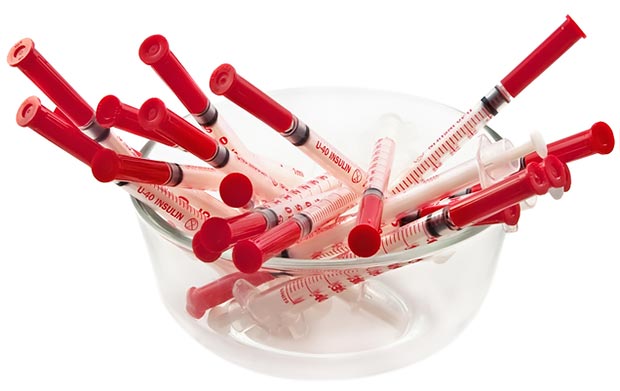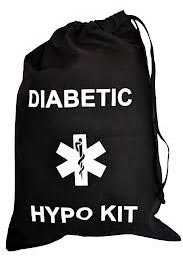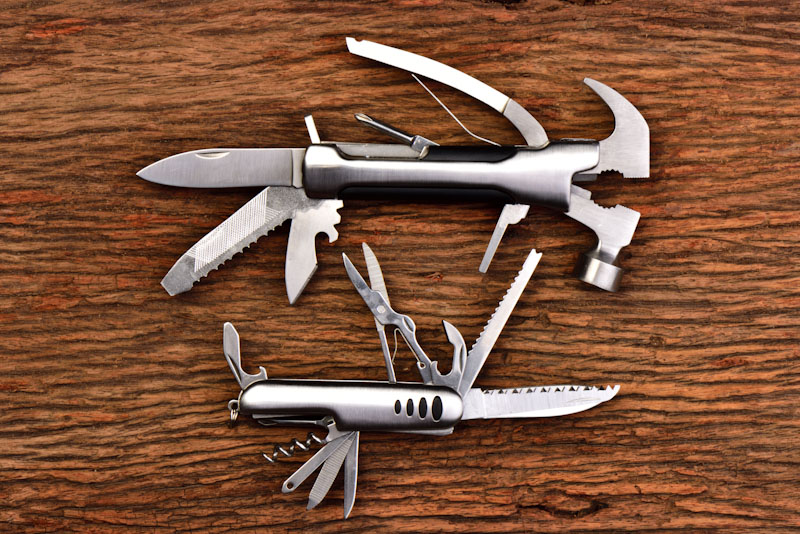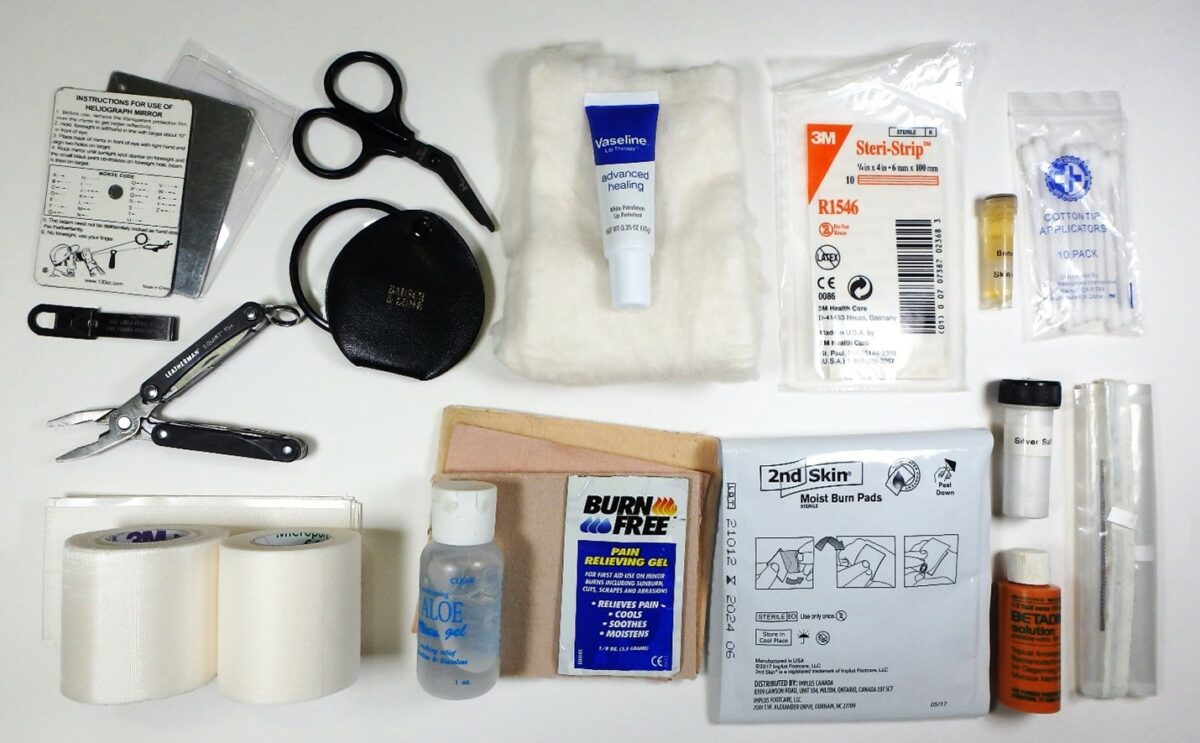Coping with diabetes is hard under normal circumstances. Diabetics need to take regular medication; they must stick to a strict diet and are prone to illness and infection. All of these problems get exacerbated when SHTF. If a disaster happens, a diabetic is left much more vulnerable than the average person. He must take special precautions in order to ensure that he is fit to handle the situation.
After an SHTF event, people with diabetes need to attend to their special medical needs. If they are lucky, they still have access to medical help soon after the disaster strikes. This is not always the case, however, but, if it is, they need to be prepared. They might not be able to communicate with the healthcare professionals due to injury or shock.
Furthermore, the people treating them might not have access to their medical history. That is why they must identify themselves as diabetics so they can receive the proper care. Therefore, the first important guideline for someone with diabetes is to always wear a medical bracelet which provides valuable information regarding their situation.
Preparation Is Key
Oftentimes when SHTF, help is not immediately available. In fact, on many occasions, it can be days or even weeks until you would be able to reach a hospital or any other kind of medical facility. A diabetic simply cannot wait this long without proper medication.
That is why it is highly recommended to create a diabetes disaster kit. It should be easy to carry around, waterproof and insulated so that it does not get damaged. It should also be placed in an area which you can easily access, even after an earthquake, tornado or flood.
There are several items which should be part of this kit:
- Medication and medical supplies. This is the most important resource for a diabetic in an SHTF situation. You should pack as many medical supplies as you have access to since you can never know when you will have access to outside help. A 30-day pack would be ideal. If this is not possible, make sure that the medicine will last you at least 2 or 3 days. The supplies should include insulin, insulin pumps, syringes, glucagon, testing strips, glucose tablets, glucose meters, extra batteries and anything else that you use on a regular basis to treat your diabetes.
- Extra supply of drinking water. Again, it is a good idea to store a lot of water around the home since it becomes a valuable commodity when SHTF. However, keep the water in the disaster kit to about 2 or 3 days worth. Any more and the kit would become cumbersome and difficult to handle.
- A few days worth of food. Besides medication and water, food is extremely important to a diabetic as they need to stick to a specific diet. That is why the food kept in the disaster kit should have two qualities: be nonperishable and be safe for a diabetic.
- Copies of your health records and medical history. In addition to these, you should also keep a list detailing all the medications you are currently taking plus the diet you are on.
- Contact information for family, friends and physician.
When talking about something as dangerous as diabetes, there is no such thing as being overprepared. That is why it is a good idea to keep vital extra supplies such as medication and snacks around other places you regularly visit such as your workplace, homes of friends and family, your neighbors etc.
Insulin is the most important medication for any diabetic so you need to look after it properly. It does not matter how many vials of insulin you have in an emergency if they have not been preserved in an adequate manner.
The good news with insulin is that it does not need to be refrigerated. It can safely be stored at room temperature for as long as a month, as long as that temperature does not exceed 84 degrees Fahrenheit. However, in many areas, the temperature will routinely pass that limit. That is why it is also a good idea to have a cooler to keep your emergency supply of insulin in.
Adding to the disaster kit would be several packets of re-freezing gel in order to maintain proper storage for the insulin even if the electricity goes out.
How to Spot Hypoglycemia
The biggest emergency that a diabetic has to deal with is when blood sugar levels are too high or too low. For a diabetic on insulin, it is important to monitor blood sugar levels at all time in order to make sure that they do not dip below recommended levels.
When this happens, there is a huge risk of suffering from hypoglycemia, a problem which can occur in both Type 1 and Type 2 diabetics. It is most often brought on by missing meals or medications at regular intervals, two scenarios which are very possible when SHTF.
The standard threshold for hypoglycemia is 70 mg/dl, although the actual limit differs from person to person. Even so, knowing and detecting the symptoms of hypoglycemia early on can give you enough time to take the necessary precautions.
The symptoms include dizziness, sweating, shakiness, hunger, fatigue, confusion, an erratic heartbeat and even loss of consciousness. The best course of action if you feel any of these symptoms is to take something that raises blood sugar levels and acts fast. Recommendation would include glucose tablets or natural juice.
Dealing without Medication
By their very nature, SHTF scenarios are unexpected. It is quite possible that you get caught in one such emergency without the medication you require or with lower levels than needed. It is important to know what to do when your insulin is in short supply.
Basically, you will need to stretch out your supply as long as possible in order to wait it out before help arrives. Your diet will play a big factor. Try to avoid eating food rich in carbohydrates and instead go for food full of proteins.
Moreover, you should know who you can contact if the communications lines are up. The Red Cross, the International Diabetes Federation and even the American Embassy can all provide you with an emergency supply of insulin if access is cut off to your regular supplier.
As you can see, having the proper knowledge and the proper guidance can help anyone overcome a SHTF scenario, even someone with diabetes.
Do you fear about living with chronic disease after disaster? Share your thoughts with us using the comment form below.
This article has been written by Bella Scotton for Survivopedia.










Pingback:Surviving with Diabetes after SHTF | TheSurvivalPlaceBlog | March 1, 2014
|
Tony | March 3, 2014
|
I’ve been a Type-2 Diabetic for over 15 years. So I comment from experience… The graphic included in this article is lacking ‘real’ information. I have never seen any blood glucose meter ever display any of this kind of ‘numbers’. Typically these test meters are the [no pun intended] life-blood information we as diabetics use to regulate any +/- of insulin, and their displays are in mg/dl [milligrams per deciliter] like the graphic. However, the actual ‘numbers’ in the graphic would mean you are dead from those who have educated me. For example I struggle to keep my ‘reading’ below the 140 mg/dl, and I’m advised that average people [non-diabetics] operate in the 85-120 mg/dl. If perchance these ‘numbers’ represent some other value, they should reflect the real world to a wider audience.
John Gramer | March 3, 2014
|
The best I can tell, the numbers shown should be labeled as mmol/l not mg/dl,
by using a conversion factor of 18 (mmol/l *18 = mg/dl) you should see more familiar numbers. This conversion factor is not exact but is close enough to work with. The actual conversion as best as I can find is 18.018018018018018018018018018018~ or 18.01802
Note that this conversion rule refers only to glucose.
Karen r. | August 3, 2014
|
The numbers are what show up in the Canadian glucometers. Most glucometers have a choice of mmol/dl or mg/dl and are usually set either by the healthcare practitioner or the patient when first obtained.
MIchael | March 4, 2014
|
Had the same reaction to the diagram. While I’m not a diabetic, my wife is a Type II, and I’m quite familiar with her blood meter. I think anyone associated with a diabetic needs to learn how to take their blood. Low blood sugar can be misleading and mistaken for something else. Just because the person is getting quiet, perhaps slurring words or not using complete sentences, don’t assume they’re tired or consumed too much alcohol or “something” – ask them to check their blood sugar OR be prepared to assist. Missing this window of opportunity can mean they’ll soon be passed out on the floor.
Solid article. Chart needs to reflect what’s actually seen on a common blood meter, and I would ensure that everyone involved with a diabetic knows how to use the meter (and associated “poker” and test strips).
Deez | August 4, 2014
|
Since it appears there are 2 different scales, perhaps it’s best to know both since in grid down events, no one will be up to figuring out conversions when other things take priority. If we can’t know both, the perhaps have a copy of both in your carry kits for others to know if you or your loved one can’t speak up for self.
Fay | March 3, 2014
|
My mum cured her type two diabetes with the Atkins diet. She monitored her blood sugar and had to cut back on her tablets over a two week period according to her blood sugar levels. It’s all over the net that eating grains could be the cause of diabetes and I’ve seen comments on the net that a strict caveman diet (just like Atkins diet) will get diabetes in check.
Food for thought…..
Dee | October 11, 2015
|
With due respect to your mum. Like so many other chronic health issues, each person responds differently. Having several family members and friends with diabetes, your mum’s method may work for some but not for some others. Other health considerations, along with which foods actually work for one’s own body is so important when managing diabetes. The important thing is to find what works for each person, then also be prepared for changes, because like anything else, our bodies change as well. What worked 3 years ago, may not work in the future. Just like other stuff we prepare for, if you have a medical challenge, stay on top of any advance which may give you an edge, because as some of us know, life gives us the unexpected just to see if we’re ready for it. 😉
Mr Charles J Bowen | March 3, 2014
|
I am glad that someone actually has an article on what is needed in a disaster. I am a diabetic, type 2 on pills till I had my liver transplant. After the transplant I had to go on insulin, pills were bad for the liver. Everything I read about prepping, that had medical advice, nothing for diabetics until now. now all I have to find is what to have on hand and how to get extra medications for treating my transplant when a disaster happens.
Again thanks for this great article.
Don | March 4, 2014
|
I’ve been a diabetic for years. When I was working I took medication, but for the past year since I lost my health care, I have taken no doctors prescribed medications. I’m still here. My problem is that I love to eat, so my gluecose numbers can get much higher than the normal range. I want to share my solution to control my glucose spikes and bring them back down under 180. I buy a large supply of a glucose control drink, called “Boost”, which is most reasonable delivered monthly, from CVS. I drink a bottle after a meal and I’m fine. If I test later and my level is too high, I have another. Each bottle of Boost brings my glucose level down about 50 points, making my levels closer to normal. It is also part of my SHTF preparation, having no other medication.
Also, save some money by asking for “free diabetic related samples from your doctor” to put in your Diabetic SHTF Kit. That’s how I started mine.
Al l | March 4, 2014
|
My insurance company will only release a new med if I only have only a few pills(Medicare)
How do I build up a stock of medecine
Thanks
Don | March 4, 2014
|
Walk in and ask your pharmacy if you can buy some extra stock because you are leaving for some reason. When I tried this, I was able to pay for an extra months worth of meds for my wife. It is more expensive to do this, but it works. Find out how much they will charge, before you decide if it is worth the expense. Consider how it would be without it.
Ryan | August 1, 2014
|
Most insurance companies will let you refil a prescription a few days before your supply runs out. By getting your refills early you can build up a supply pretty quick.
I am a type 1 diabetic and have built up about a years supply of insulin this way.
For those of you looking to keep insulin cool in warm weather look up a “Zeer pot” it is a kind of evaporative cooler made from 2 clay pots and some sand. After it is built simply wet the sand and as it evaporates it will cool whatever is inside.
Deez | August 4, 2014
|
Just a note on the zeer pot. It works better in a drier climate than a more humid climate.
Ryan, I do has you have done and working up to a 1 year supply. I also know of a few creeks locally where I can store my cache to keep in cool and hidden.
Art | June 21, 2020
|
I hate to say this, but if you take out 1 pill every month in a little while you will have a months supply.
DARLENE | March 4, 2014
|
Thank you for this well-written article concerning emergency preparations for those with diabetes.
As a person with Type-II diabetes, a retired registered nurse, and a retired certified diabetes educator, I would caution your readers about some of the comments that have been written.
Diabetes cannot be “cured” by eating the Atkins diet. Blood sugars can sometimes be controlled by a diet low in carbohydrates, but the root metabolic disorder of Type II diabetes – insulin resistance – is still there. For obese people who have type II diabetes, weight loss will often produce an improvement in insulin resistance and the results will be better blood sugars. For thin diabetics, such as myself, weight loss makes no difference. Diet does make a difference, but depending on the individuals metabolic system, medication may still be required regardless of the person’s diet.
Also, Boost Glucose Control drinks do not contain anything to treat diabetes. These drinks are very low in carbohydrates and high in protein, so when used as a substitution for a high carb snack or meal, they can help keep blood sugar lower. And the protein helps to prevent hypoglycemia.
And yes, the chart with blood sugar levels is listed in mmol/l, a system that is used in other countries. It would be helpful to your readers to post a graphic showing blood glucose in mg/dl, the system most often seen in the U.S.
Each diabetic’s metabolic system is different and what works for one may not work for another. It is essential that people with diabetes consult with their medical professional to formulate a regimen that works for them.
Don | March 4, 2014
|
Darlene,
You are correct, and have clairified our comments very well. Thank you for your perspective. My comments about Boost are what I have seen for myself. It is true that other people may have different results. You give good advice.
Todd | March 5, 2014
|
I’ve read several publications explaining that TYPE 2 diabetes is caused by lifestyle and therefore is absolutely reversible. To say there is no cure is incorrect, but the “cure” is not a magic pill or surgery. Certainly it is not easy to change ones lifestyle in this processed food culture and I suspect that many who have tried have not succeeded. I agree with you though Darlene, that what works for one will not work for another. Each persons biochemistry is a little different, but in every diabetic that chemistry is unbalanced and needs to be reset.
d. | March 28, 2014
|
I agree to Todd’s summation of this article and the comments. I just found out through journaling that some of my blood pressure meds and heart meds run my sugars high. Sometimes 100-200 pts. If your numbers are high start a journal and what is new or changed. even with meds.
Carol | April 8, 2014
|
Thanks for your “educated” comments! We need more of this type of info when planning for emergencies! Not sure my Dr. will cooperate with me on this, but we’ll see! Again, thanks!
Fay | March 4, 2014
|
Hi Darlene,
We watched a video put out by DOCTOR Atkins who stated it would cure diabetes. After being on the Atkins diet for a few months my mother was able to give up all medication and even eat chocolate Tim tams without her blood sugar levels going up. Other friends, taking my mothers advice did the same and no longer need meds. Doctors are always stating that something doesn’t work when what they really mean is that it’s outside of their knowledge base or outside of their own interests. I’ve spoken with doctors who’ve stated, “no, don’t say that; we aren’t allowed to talk about that”. Do you really believe they’ll find a cure for diabetes (or cancer) when the money being raked in is massive?
There are books written on how to prep, paleo style. Wouldn’t that be easier than trying to store meds? You don’t even have to think that you might be cured…. Just stash proper food supplies to “control” the diabetes.
Mr Charles J Bowen | March 5, 2014
|
Thank You Fay for the reply. I have heard of the Atkins diet, but never looked into it. I have been doing some reading on the, paleo style, on some of the prepper sites. Since we are growing our own vegetables, this might be a better choice.
Fay | March 12, 2014
|
Bitter melon contains a chemical that acts like insulin to help reduce blood sugar levels.
(This information from webmd)
Also, I’ve read where mulberry leaf tea or crepe myrtle tea will reduce blood sugar.
Jerry | April 13, 2014
|
Hi
Solid article and for those who are seriously interested in participating or attending the first ever Reversing Diabetes World Summit on May 5, 2014 with a panel of over 40 experts who are guaranteed to knock your socks off … registration is free today at http://www.thediabetessummit.com
Namaste,
(And no – this is not an affiliate link)
Deez | August 4, 2014
|
I come from several generations of diabetics. Just know there are more than just type 1 and 2. There are several sub types of which LADA (1.5) is one. It’s also not about people who ‘overeat’ or have a sweet tooth. There are some fat people who are really malnourished, their bodies are just showing it in a different way than the stereotype. This is just to say, this article can’t cover all of such a complex illness. I have seen and know many who are managing diabetes just with diet. Cured? No, I do not believe this. When I hear this said, I want to ask, how long have you been ‘cured’? I believe from personal experience AND from family history that diabetes, like cancer and other illnesses, can go into ‘remission’ but once triggered, is there for the rest of one’s life.
This is a great article even though short, therefore some information is missing just by the comments. One example of missing info is there is a form of low blood sugar event which people also need to know—low sugar unaware—-this is when there are no signs of blood sugar levels dropping or the signs happen just before the person become unconscious.
So here’s what my preps: 1) I now have a letter (sent via snail mail to make it more ‘official’) in my medical carry bag which says I am diabetic, what type of insulin I use and dosages, what type of meter and other equipment I use.
2) In my medical carry bag, contains 2 of each type of insulin + meter and other needed supplies to last 2 perhaps up to 4 days depending on the food supply, plus the letter and ICE information. For those lows, I now carry a couple of containers of raw honey with instructions on the outside of container–clearly stating what to do with it and how much to give. On the outside of the bag (less than the size of a small pencil box) is a large “+” sign with Medical Alert written out.
3) I have spent the past couple of years, learning what medicinals I can find by foraging around my area. Learning the symptoms of my body’s needs not just to hunger, but differing from thirst, low blood sugars (wasn’t ready for those low bl sugars unaware, but now know they exist and am figuring out those). And learning how to stretch my insulin and still maintain a relatively stable level of sugar levels.
4) I’ve trained my dog to alert for highs and he’s now learning how to alert for lows cuz I so dislike getting so low I can’t speak loud enough to get help.
Thanks so much for posting this article. It can help not just diabetics but those around them. Just being diabetic doesn’t mean a grid down event makes one useless or a death sentence. 🙂
Pingback:Survival Skills For The Person With Diabetes | Family Survival | October 31, 2014
|
louise lane | August 1, 2015
|
I fear that this will happen but are they really positive about when. If it doesn’t come about on Sept 23, does that mean where safe for awhile.
joyce yoder | April 19, 2016
|
I too am in the same boat as the rest of you, and think about positive ways to help myself in the event of. We shouldn’t become overly obsessed and dwell on it, stress, as I found out produces what is call cortisol which raises your blood sugar, even though I was following my low carb diet, getting my sleep etc. Talking and getting together with other individuals like myself have helped me to be more responsible and less worrisome over things I can’t control and more secure about the things I can control. Like having an emergency pack in your car with medi alert sign on it in plain view, in case of accident.
Michel | October 10, 2015
|
I’m old, so I get to make some mistakes. Thought you were an Aussie, my bad. No false aimardtion intended. You are one of the better posters and that is a real compliment, without any fawning. Yes, I do remember the CSA gardens and the light shines now. As far as well adjusted kids ooohaa! You done good, girl! ALL children should be raised that way. My favorite author is Robert A. Heinlein. He has a book, Tunnel in the Sky , where high school graduates are teleported to another planet with meager supplies and to finish graduation they have to be at the designated pick up point in six weeks to graduate . Oh, God, would that they do that today. There would be a lot less pollution in the gene pool, deep or shallow end. LOL. Hope things are good. Survive well. Enjoy.VA:F [1.9.22_1171]0 0
Pingback:Survival Foods To Stockpile For Diabetics | Survival skills, survival guns, survival guide | October 14, 2015
|
Pingback:Survival Foods To Stockpile For Diabeticsdisasterdefense.us | disasterdefense.us | October 14, 2015
|
Pingback:Survival Foods To Stockpile For Diabetics - The Prepper Dome | October 28, 2015
|
RLABruce | June 22, 2017
|
I’m surprised that the issue of diabetes in preppers is covered without an emphasis on reducing or completely eliminating the need for medications in the first place. I am a type 2 and have devoured many of the so-called “cures” as well as helpful tips and tricks available on the internet. The most helpful ideas are:
1. Don’t eat sugar or starches. For me it means no more candy, chocolate, bread, crackers or pasta. Don’t eat so-called “sugar-free” snacks, either; most still have some form of sugar in them, or contain chemicals that no one should eat. Yeah, I know, it’s hard! But after six weeks you won’t even want sugar, believe it or not; it won’t taste very good anymore.
2. Get on the Atkins Diet, Meatlover’s Diet or something similar. The key is to eat some kind of dead animal three times a day, high in protein and animal fat, moderate vegetables, no grains, no sugars or starches. No, fat does NOT make you fat! Sugars and starches are easily stored as fat, so get rid of them. Bacon or sausage with eggs for breakfast and/or lunch, dry salad (no dressing), and vegetables, NO POTATOES.
3. Get plenty of exercise. But not just any exercise. Start out “binge” exercising, where you sprint, swim, jump rope, climb stairs, whatever you want, fast and hard, for a minute or until your muscles are burning, then rest two minutes, until you can do it again. If it’s too hard at first, cut back on the times but maintain the 1:2 ration; 15 seconds of exercise followed by 30 seconds of rest, for instance. The stop and start pattern of intermittent hard exercise forces insulin-resistant cells to start absorbing insulin again. Work your way up to doing this on-again, off-again for 30 minutes, twice a day. I keep a chart to keep up with the exercise I do, as well as how long and how many I do. It helps if you can see written proof of your progress!
This is what works for ME; I have a way to go, and it’s tempting to backslide. You have to decide for yourself if your life is more important than eating whatever you want. Everyone is different, and if you have other health issues you should see a doctor to see what you can safely do. Good luck!
Pingback:Survival Foods To Stockpile For Diabetics | Survivopedia | November 14, 2018
|